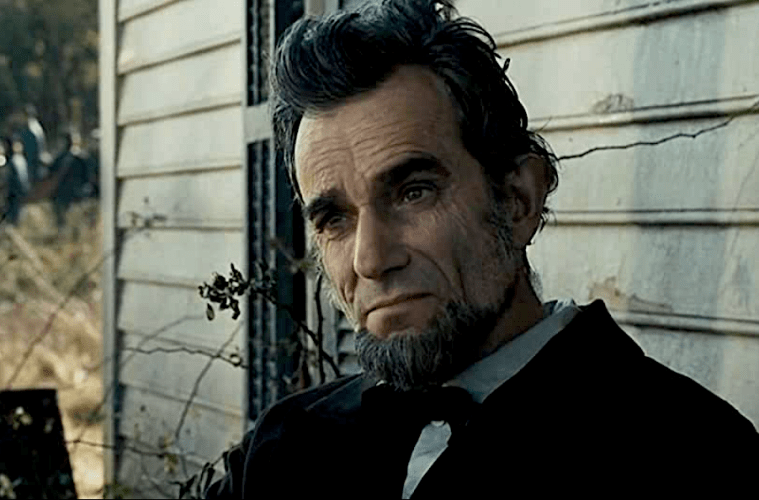Movies and American politics make an intriguing pair. Sometimes the bond works, other times it comes off cartoonish and silly. Either way, Hollywood has a rich history of depicting The White House and the byzantine characters who take on the mantle of Leader of the Free World. Whether fictional or based on real, historical figures, the presidency has been fertile ground for entertaining audiences for decades now. So why is such a seemingly tedious subject always getting the Hollywood treatment? Let’s face it, politics can be intensely boring (have you ever watched CSPAN?), not to mention many presidents just lack the panache we expect from movie stars (unless you’re Barack Obama). Of course, it’s the drama we’re continuously drawn to. Stories about the fiery Shakespearean pandemonium in the oval office and the archetypal American president character who leads, recall the sagas of Macbeth, King Lear and Henry VIII (hell, even King Arthur), and they never cease to comprise both comic and tragic underpinnings.
Being the President is surely just as thrilling as the movies that portray them; maybe even more so. Drama just comes with the gig. Every decision the president makes not only affects millions of people and sets the tone for the country but gives us an insight into their character and moral compass. This is pure soap-opera material here. Most movies about politics usually have a little more ambition than just entertaining us. Political films (good ones at least) reconstruct past events in a distilled context so we can look back at them and see where we achieved greatness or failed miserably. During this difficult time, with a worldwide pandemic and one of the most important elections in recent memory finally here, it can be revelatory to revisit these cinematic explorations of the presidency, politics and our government. They can remind us of a time when movies had interesting and complex characters; just as our country required intelligent and compassionate presidents. For the last four years, we’ve been deprived of both.
So, here is a list of ten dramatic movies about American politics and the presidency. We decided to skip classics like Mr. Smith Goes to Washington and The Manchurian Candidate and stick to more contemporary fare that speaks to the flagrant corruption we’ve been witnessing on a daily basis. Enjoy, and remember, You are the Government!
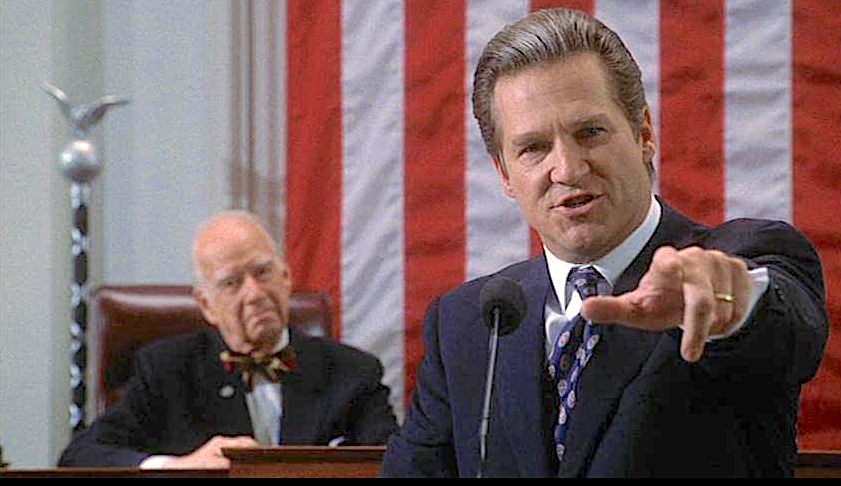
THE CONTENDER (Dreamworks)
The Contender
Inspired by Kenneth Star’s crusade to take down President Clinton for his infidelities and sexual malfeasance (which led to his impeachment), Rod Lurie’s The Contender stars Joan Allen as a Democratic Senator who’s been picked for the Vice President position after the current one dies unexpectedly. That is, until a rumor about her sexual history threatens to derail her post. Jeff Bridges is great as the President who backs her every move (and has a strange obsession with ordering any meal he wants from the oval office), while Gary Oldman is at his balding, lurid best as a Republican senator who’s determined to smear Allen’s reputation at all costs. The scenes where Oldman resides over Allen’s confirmation hearings are not only fraught with an authentic tension, but they also set the stage for two powerhouse actors going head to head. As a former journalist, writer/director Rod Lurie knows the elaborate inside chess moves involved in the political realm and outwardly rejects the partisan slant in the name of “morality.” Although released in 2000, The Contender still packs a punch, exploring subjects like sexism, double standards, gender bias and the right to privacy.
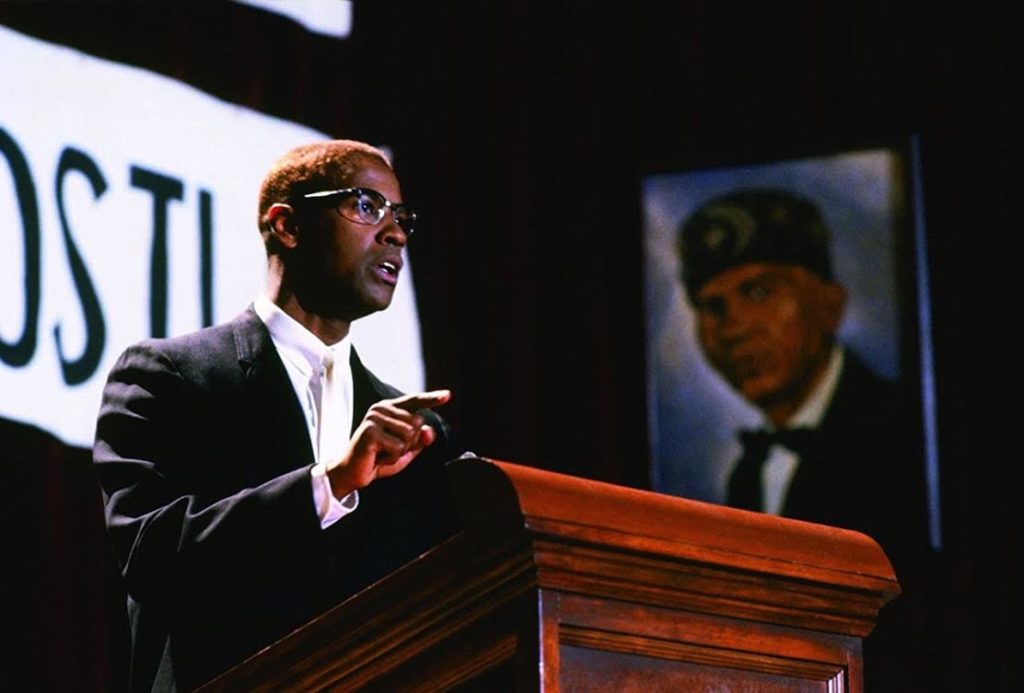
MALCOLM X (Warner Bros.)
Malcolm X
The legendary African American activist Malcolm X may have never held a government position, but he changed the way we view race in this country. While Martin Luther King advocated for togetherness and peace, Malcolm X created a platform for righteous indignation and cultural pride. He was willing to fight back and achieve equality with “all means necessary.” This is a beautiful, sprawling film, which places Malcolm’s spiritual and political journey in the context of the classic American hero’s expedition. With a running time of nearly three and a half hours, Spike Lee’s heartfelt portrait of one of the civil rights’ most controversial leaders is a homage to an extraordinary man who lived several lives before he was assassinated. From petty criminal to strong-willed activist and finally to an Islamic peacemaker, Denzel Washington plays Malcolm X with such fervor you can feel the heat come off the screen. This one doesn’t focus presidents or politicians as does everything else on this list, but we included it because he was just as powerful, and the film shows how he scared the pants off them. Malcolm X rang a liberty bell which still resounds today, and his message was an inspiration for the Black Lives Matter movement.
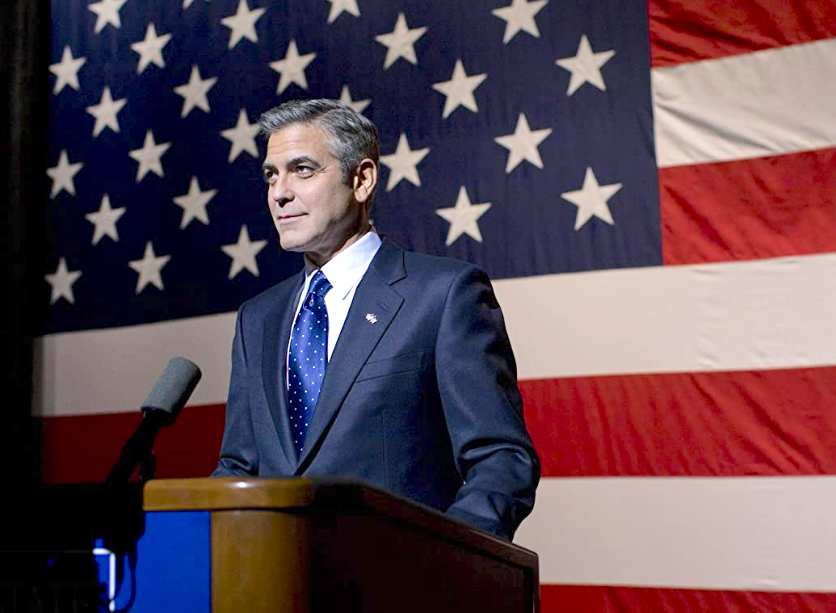
THE IDES OF MARCH (Sony Pictures)
The Ides of March
The road to the presidency can be rockier than the job itself. George Clooney’s fourth directorial effort, The Ides of March, is an intuitive thriller about the dirt, corruption and distorted egos on the campaign trail. Ryan Gosling is Stephen Myers, an idealistic and impressionable press secretary working for Pennsylvania Governor Mike Morris’ (George Clooney) presidential campaign. Once Gosling is pulled under the wheels of a disturbing sexual and political scandal, he’s forced to shed his innocence in order to play hardball. Based on Beau Willimon’s play, Farragut North, The Ides of March not only illustrates the delicate manuevering of positioning a candidate for the presidency but introduces a cast of smarmy characters that litter campaign trails like rats in a landfill. This amazing ensemble cast includes Philip Seymour Hoffman, Paul Giamatti, Marisa Tomei and Evan Rachel Wood. The Ides of March came out in 2012, when life was somewhat normal; if it were released in the past few years, it would be deemed a classic.
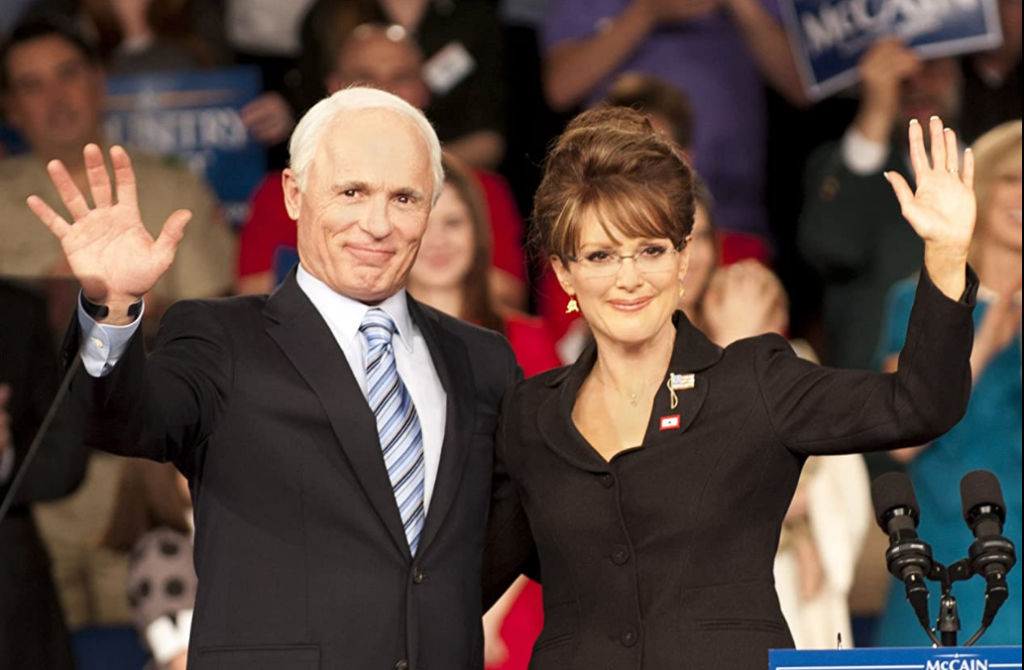
GAME CHANGE (HBO)
Game Change
Jay Roach’s depiction of the failed McCain/Palin campaign has a lot of comedic moments, but at its core it’s a sad commentary on the current state of grass-roots campaigning. When John McCain (Ed Harris) ran against Barack Obama in 2008, he hurriedly picked Alaska governor Sarah Palin (Julianne Moore) as his running mate, believing she would be a “game changer.” Not only is Palin a devout Christian, but she hunts on the weekends! A woman with a gun, that’ll get their base excited! McCain strategist Steve Schmidt (Woody Harrelson) quickly realized their mistake when it became painfully clear that Palin knew little to nothing about national politics or world affairs. Even worse, she didn’t want to know. Palin quickly snubbed Schmidt’s efforts to help her and went rogue by charming crowds with “soccer mom” quips and “awe shucks” slogans. Her plan worked for a while, until an interview with Katie Couric revealed her limited knowledge of, well, politics. McCain’s campaign quickly became a joke. Although they lost to Obama, the McCain/Palin campaign created a platform where “theater” and “entertainment” became more important than understanding the issues at hand. Is it a coincidence that eight years later a reality television star would become the president and anything having to do with having a firm grasp of politics and real issues would take a backseat?
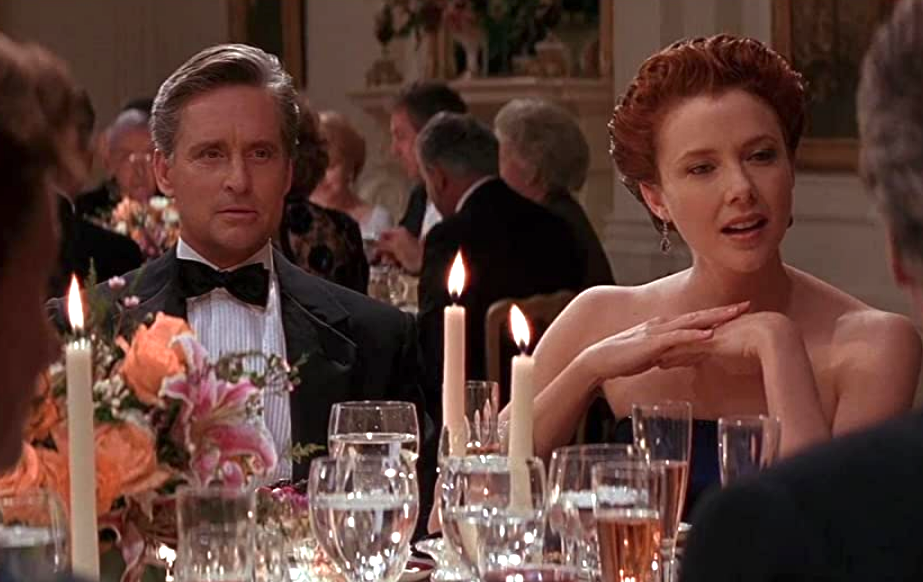
THE AMERICAN PRESIDENT (Sony Pictures)
The American President
You might start streaming Rob Reiner’s The American President and think to yourself, “Awww, a cute 90’s romcom!” But you’ll quickly realize there’s more substance underneath its sugary coat than you expected. Not a shocker since The American President was penned by screenwriter extraordinaire Aaron Sorkin, whose life’s work has been writing political satire and verbose dramas like The West Wing and The Social Network (also a very political movie, indeed). Michael Douglas plays a recently widowed sitting president who falls for an environmental lobbyist (Annette Benning). Dating in the White House is a sticky situation. Although it has some Frank Capra-esque moments, it takes a dark turn when Richard Dreyfus’ Republican senator sets his sites on the president’s love life. The American President is both a fun depiction of the daily life of POTUS and a scathing commentary on the unrealistic standards we often hold our leaders to.
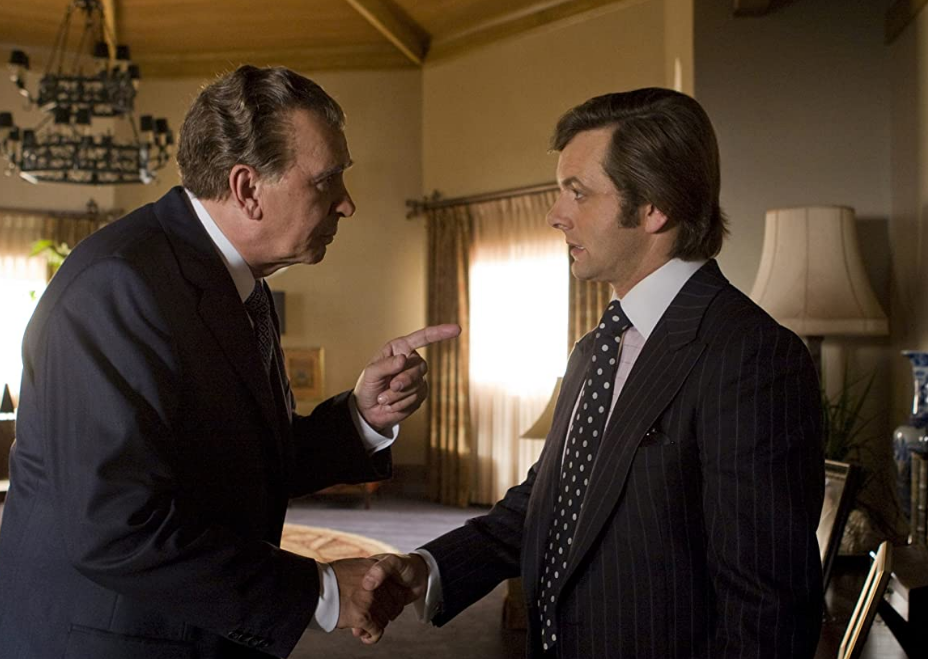
FROST/NIXON (Universal Pictures)
Frost/Nixon
Ron Howard’s recreation of the famed 1977 televised interview between British talk show host David Frost (Michael Sheen) and disgraced former president Richard Nixon (Frank Langella) is a masterclass in acting. Frost/Nixon could’ve easily been a long slog with two dudes talking in a room, but Peter Morgan’s screenplay (based off his stage play) shrewdly focuses on the preparation of the historical interview instead of their final battle of wits. Frost/Nixon actually plays like a political Rocky with a team of political academics (including a hilarious Sam Rockwell) prepping the British comic to get in the ring with Nixon – a disgraced man who’s mastered the art of stonewalling his critics. By the time Frost pushes Nixon against the ropes, getting him to admit his part in the Watergate scandal, it’s apparent that the interviewer’s inexperience in politics actually plays to his strengths. And when Nixon inadvertently says, “I’m saying that when the President does it, that means it’s not illegal,” we realize that corruption is not only quite real, but deeply embedded in The White House psyche.
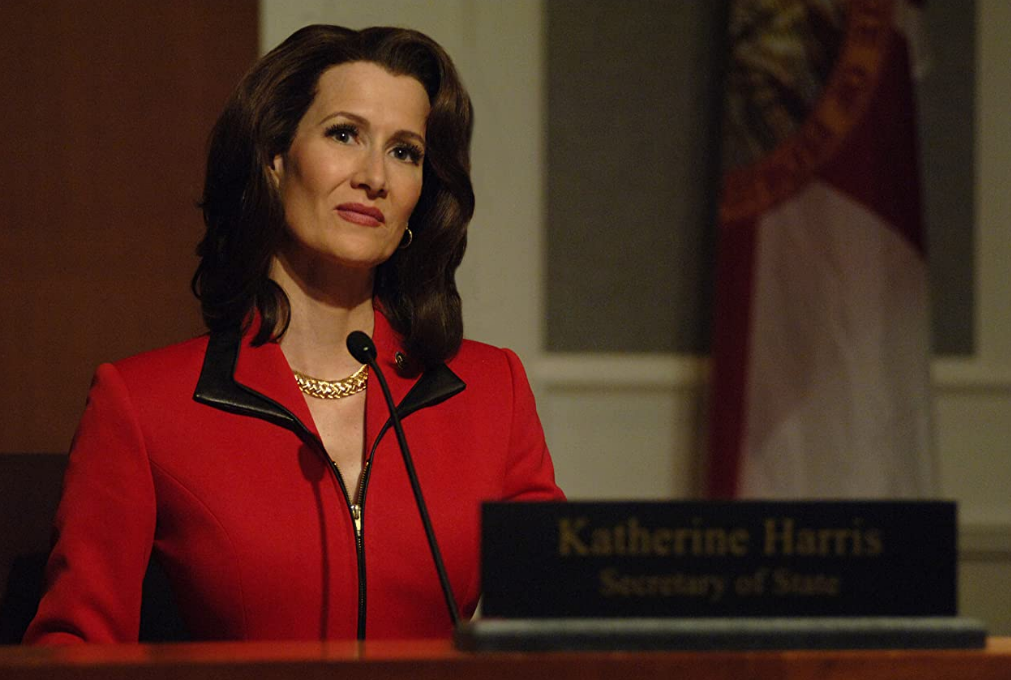
RECOUNT (HBO)
Recount
Jay Roach’s (Game Change) dramatization of the 2000 election and ticking clock showdown between George W. Bush and Al Gore in the Florida primaries is an enjoyable albeit painful enterprise. Kevin Spacey and Denis Leary play Ron Klain and Michael Whouley who realize, just as Gore is about to concede, that the voting numbers are way off in Florida. On the right side of the aisle, the great Tom Wilkinson plays Bush strategist James Baker. Laura Dern is spot on as the outrageous, make-up clad Secretary of State Katherine Harris. All these players rush to the Sunshine State to find out what happened. What they discover are a bunch of misread ballots, broken voting machines and “hanging” or “swinging” Chads (paper indentations in the ballots). At first the Florida Supreme Court gave Democrats the right to recount the votes, but ultimately the right-leaning US Supreme Court shut it down, basically giving George W. Bush the win. Many of us remember the uncertainty of the 200 election, and with Trump’s recent attempts to question what should and shouldn’t count, this one feels timely again. The fact that Supreme Court Justices John Roberts, Brett Kavanaugh and the newly appointed Amy Coney Barrett all assisted the Bush legal team on this case makes it all the more relevant. Let’s just hope we don’t need another recount this week.
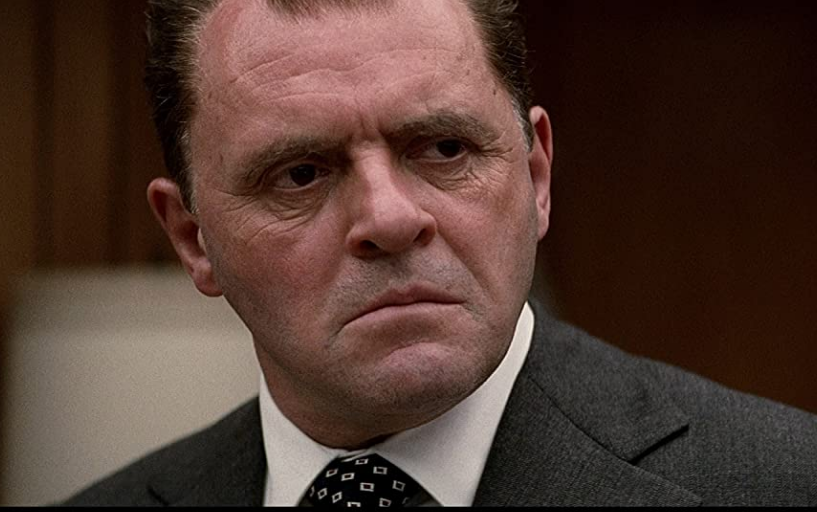
NIXON (Buena Vista Pictures)
Nixon
Oh, what would we do without the political ire and leftover Sixties wrath of Oliver Stone? Throughout most of his career the controversial director practically created a genre of film dedicated to dissecting “the system.” Whether targeting the media in Natural Born Killers or indicting the government’s case on the JFK assassination (JFK), Stone seems like a man who’s never satisfied with closed-book answers. Stone’s restlessness is precisely why Nixon might be his most captivating film. Instead of blowing shit up, Stone slows things down and takes a meditative look at the 37th president, who’s resignation shined a light on corruption at the highest levels. Anthony Hopkins’ finely tuned and nuanced performance portrays Nixon as a disgruntled, agitated and deeply unhappy man. But instead of simply tearing him down, Stone’s interpretation of Nixon’s downfall is one of classic Greek tragedy and surprising empathy. In Stone’s view, Richard Nixon could’ve achieved great things, but due to his own paranoia, vitriol and abuse of power, he imploded. Nixon is not just a tragedy, but an indictment of the imperialist nature of the presidency itself.
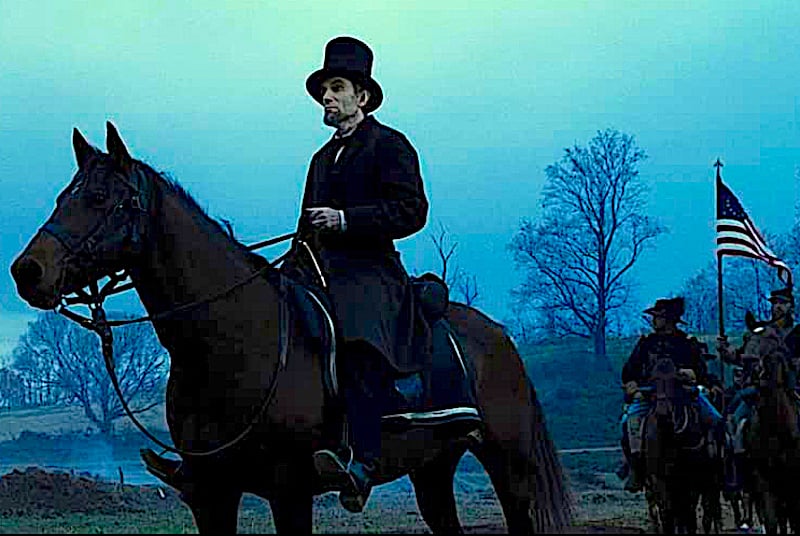 Lincoln
Lincoln
Daniel Day Lewis turned in another Oscar-winning performance as the most important president of all time in Lincoln. Director Steven Spielberg’s homage to the bearded leader who crowned his legacy by not only ending the Civil War but abolishing slavery is far from a grandiose puff piece. Unlike past Abe clunkers, Spielberg’s film depicts the man, warts and all, not just his stiff iconic presence. Lewis plays Lincoln as both charming Midwestern huckster, regaling his constituents with humble guffaws and bad jokes, and an uncompromising, no-nonsense politician who knew how to take on his opponents. Tony Kushner’s dense script details how pushing the 13th amendment, which abolished slavery, was a tough and hard-won enterprise. For the way it tells this part of the story alone, Lincoln should be shown in every high school.
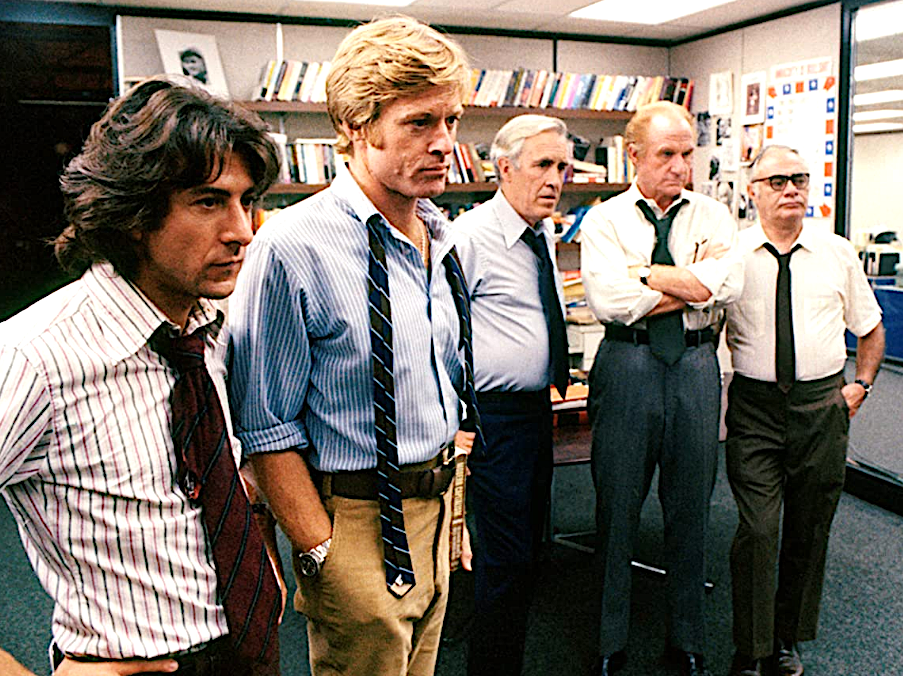
ALL THE PRESIDENTS MEN (Warner Bros.)
All the Presidents’ Men
Here it is, the grandaddy of all political films, and for good reason. All The President’s Men, the 1976 Alan J. Pakula-directed true story about two reporters who took down a president holds up beautifully. Robert Redford and Dustin Hoffman play Washington Post reporters Bob Woodward and Carl Bernstein, respectively, as they expose the Watergate Scandal, which eventually led to Nixon’s resignation. The genius of All the President’s Men doesn’t reside in the overall story, which is quite renowned, but in the details of their deft journalism. The movie literally tracks their every move in getting this story to the public. In a day and age where journalism is under attack and unremitting rebuke by conspiracy theorists and bloggers alike, All the President’s Men reminds us that journalism is not only a real trade, but an important one at that.
Advertising disclosure: We may receive compensation for some of the links in our stories. Thank you for supporting Irvine Weekly and our advertisers.

